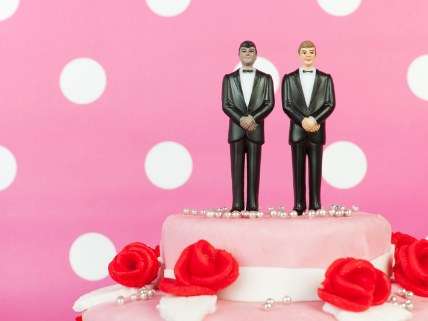Now That Gorsuch Is Seated, Will Supreme Court Take Up Gay Wedding Cake Case?
SCOTUS has delayed making a decision whether to tackle religious freedom claim.

Today is newly seated Supreme Court Justice Neil Gorsuch's first day at the office hearing cases. He is apparently not going to be a quiet, Clarence Thomas-style justice and asked several questions during the first case before the court.
Before this morning's case—which is a procedurally-oriented matter about the processes required appeal federal work discrimination complaints—the Supreme Court released its list of orders from last week's conference and decided not to take any new cases as yet. Gorsuch did not participate in this last conference but will for the next one.
This matters because the Supreme Court has repeatedly declined to make a decision whether to take a high-profile case about businesses declining to serve gay weddings and has been bumping it to future conferences since last December. It rescheduled the case yet again this morning.
That case is Masterpiece Cakeshop Ltd. v. Colorado Civil Rights Commission. This is a case about wedding cakes, gay marriage, and whether businesses can decline to provide their goods and services on the basis of religious beliefs. Jack Phillips, owners of Masterpiece Cakeshop in Lakewood, Colorado, declined (all the way back in 2013) to bake a wedding cake for a gay couple's wedding. This decision ran him afoul of Colorado's public accommodation laws, which forbid discrimination on the basis of sexual orientation.
Phillips' response, as we have seen in many of these cases, is that he's not refusing to serve gay people, but he has religious objections to gay marriage and sees being obligated to make a wedding cake as being compelled to put his stamp of approval on it. Courts across the country have disagreed with Phillips and other businesses that serve weddings, like florists and photographers. Courts have thus far declined to accept the argument that refusing to serve gay weddings is somehow different from refusing to serve gay people. Furthermore courts have declined to accept the claim that floral arrangements or wedding cakes are a form of protected expression and that compliance with law compels speech or forces people to compromise their religious beliefs.
That the Supreme Court kept pushing back a decision on whether to take this case until now is significant because they've already previously rejected to hear a similar fight. A photographer in New Mexico tried to get the court in 2014 to hear their case where the state told them they couldn't refuse to provide their services for a gay couple's wedding. The photography company, like Masterpiece Cakeshop, lost their challenge to the law, and the Supreme Court declined to hear the case.
Now, three years later, the court appears to be delaying a decision at least until Gorsuch has been seated. There haven't been any cases where higher courts have accepted the arguments of the religious shop owners, so there's no "split" that requires the Supreme Court to resolve. Most recently, a florist in Washington State lost her challenge just like the bakery and photographer had before her. It's possibly significant that the Supreme Court didn't again simply refuse to certify a case that's very similar to one they've rejected before.
Damon Root has carefully analyzed what Gorsuch is likely to be bringing to the court here. On Wednesday, the Supreme Court will be hearing a case connected to the boundaries of separation between church and state. The question at hand is whether it's constitutional for Missouri to withhold grants from a state program funding playground equipment from religious schools. Missouri's state constitution forbids it; the religious schools say this counts as religiously motivated discrimination.
The only real fundamental overlap here with the bakery case is the invocation of religious freedom, so be wary of reading too much into any questions Gorsuch might ask in that case. Nevertheless, it's worthy of noting that the court held on to the bakery case long enough for a ninth justice to be seated before deciding whether to take it. We may find out next Monday.


Show Comments (57)